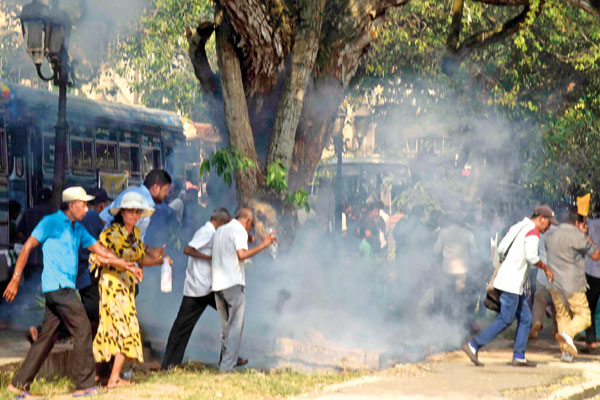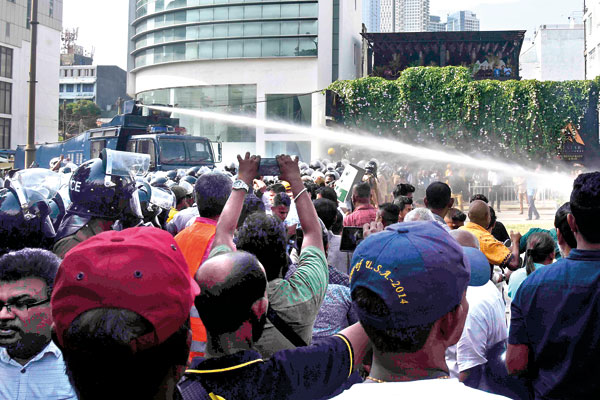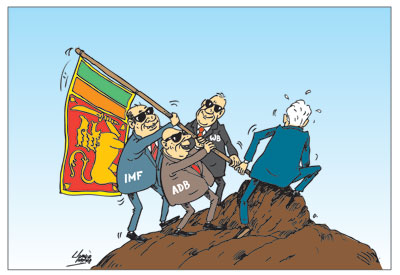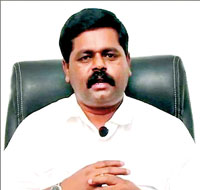- Constitutional Council rejects President’s nominee for vacancy in Supreme Court; tussle looms between executive and legislature
- President meets SLPP and other pro-Govt. groups for election-related talks; SLPP wants one-on-one with him
- SJB protest draws smaller crowd than expected, but police attack and Online Safety Act portrayed as anti-democratic
By Our Political Editor
For a second time, the Constitutional Council (CC) has “decided not to approve the recommendation” by President Ranil Wickremesinghe to appoint “Hon. N.B.P.D.S. Karunaratne, President of the Court of Appeal as a Judge of the Supreme Court.”
This recommendation came in a letter President Wickremesinghe wrote to Speaker and CC chairman Mahinda Yapa Abeywardena on January 9. This is after the Council had late last November failed to approve the same request. A fresh one was made after a prolonged issue over the introduction of rules governing the CC was resolved. It was published in the gazette on December 31, last year thus resolving an impasse.
In November, last year, President Wickremesinghe told Parliament that the “Constitutional Council is part of the executive” and disclosed that Chief Justice Jayantha Jayasuriya had proposed the appointment of Justice Nissanka Bandula Karunaratne to the Supreme Court. This is besides his own recommendation. He said Speaker and Constitutional Council Chairman Mahinda Yapa Abeywardena has informed him in writing that the Constitutional Council was unable to decide with three members in favour and three others opposed. Two remaining members had abstained. The stalemate over the appointments by the CC came almost in the wake of it rejecting the nomination of an Inspector General of Police. Resultantly, the then incumbent, Chandana Wickremeratne, had his term extended every two weeks. At that time President Wickremesinghe charged that there were “moves to sabotage his efforts. “ The present incumbent ,senior DIG Deshabandu Tennekoon, is functioning as the Acting Inspector General of Police.
Though no pointed reference to the judicial appointment, the President’s Media Division said in a statement last Wednesday that “if the Constitutional Council exercises the power conferred on it in violation of the Constitution, remedies have been provided for in the Constitution itself. The Hon. Speaker is the head of Parliament and under Article 4C of the Constitution Parliament exercises the judicial power of the people through Courts. Parliament is therefore responsible only to the people. The President will refer these matters to Parliament for further elucidation.”

SJB supporters who gathered at Town Hall to protest against the VAT hike and skyrocketing living costs were tear-gassed and baton-charged by police, who had obtained court orders to disperse the protesters. Pix by Akila Jayawardena
First to the full text of Speaker Mahinda Yapa Abeywardena’s letter to President Wickremesinghe:
“Hon. Ranil Wickremesinghe
The President of the Democratic Socialist Republic of Sri Lanka
Hon. President
Appointment to the Post of Judge of the Supreme Court
This has reference to your letter dated 09 January 2024 on the above subject.
The Constitutional Council reconsidered your recommendation to appoint Hon. N.B.P.D.S. Karunarathne, President of the Court of Appeal as Judge of the Supreme Court.
Having discussed at length, the Constitutional Council by a majority decision decided not to approve the recommendation to appoint Hon. N.B.P.D.S. Karunarathne, President of the Court of Appeal as a Judge of the Supreme Court in keeping with the provisions of Article 41C(1) of the Constitution. In disapproving the recommendation, the following reasons were given:-
Under Article 41C the Constitutional Council has been vested with the discretion to approve/disapprove nominations made by the President to several constitutional offices including the Court of Appeal and Supreme Court. When performing this function, the Council should act impartially and reasonably. In the exercise of the discretion vested in the Council, it must apply its mind to the decision, consider relevant factors, not consider irrelevant factors and exercise its discretion for the purpose for which it has been vested with the Council.
This discretion has been vested with the Council to protect the independence and integrity of several constitutional institutions, including that of the judiciary. Public confidence in the independence and integrity of the justice system requires that judges are, and are also perceived to be, impartial and beyond reproach. Ensuring the independence of the judiciary and public confidence in the judiciary is a primary responsibility of the Council.
In CA Writ 377/2023 (decided 17 November 2023), oral and written submissions were made by the Attorney General’s Department on behalf of the Respondents, which suggest/allege attempts by the petitioner to “bench fix” (to have matters taken up before the nominee) and thereby abuse the judicial process. The attention of the members of the Council was drawn to this serious suggestion/allegation due to the public reporting and debate on the matter. These submissions have since been verified. We took note of the fact that these oral and written submissions were made by the Attorney General’s Department, a constitutional institution that is required to act with independence. The Attorney General is recognised as the chief law officer of the State. The submissions are therefore to be taken serious note of. We further note that these submissions are not dealt with or refuted in the judgement of the Court of Appeal in the said writ matter.

It is the responsibility of the Council to take account of credible information and exercise our discretion to determine approval or disapproval of a judicial nominee, bearing in mind our responsibility to protect the actual and perceived independence and integrity of the judiciary. The Constitution does not envisage the Council making conclusive findings on credible allegations that are made but nevertheless requires the Council to exercise its discretion in approving/disapproving nominations to judicial office.
Having deliberated this matter at length and having carefully considered it in light of the constitutional duty cast upon the Council, we have taken the view that we cannot satisfy ourselves on the suitability of the said nominee for the appointment to the Supreme Court, the apex court of the country. The nomination, therefore, is not approved.
Mahinda Yapa Abeywardana
Speaker
Chairman of the Constitutional Council”
The full text of the statement from the President’s Media Division issued on Wednesday says:
“The President of the Republic of Sri Lanka under Article 4(b) of the Constitution is the organ of government through which the executive power of the People including the Defence of Sri Lanka is exercised.
“The President as the head of the executive i s duty bound to make certain appointments to high offices, including the Inspector General of Police, according to the procedure stipulated by the Constitution and in line with the President’s Constitutional duty to exercise powers pertaining to the Defence of Sri Lanka.
Therefore, the President must perform his Constitutional duties without any impediment or interference. Under Article 41C of the Constitution, the appointment of the Inspector General of Police is carried out subsequent to a recommendation made by the President to the Constitutional Council, and on the approval of such recommendation by the Constitutional Council.
“Any restraint placed on the President in the performance of his Constitutional duty would be in contravention of the Constitution. If the President exercises his powers contrary to the Constitution, the remedies available have been provided for in the Constitution itself. The Constitutional Council, which is chaired by the Hon. Speaker of Parliament and established under the Constitution has been empowered to assist the President in the making of certain decisions and is part of the Executive.
“The Constitutional Council is duty bound to perform its functions in terms of the Constitution. Requiring the Constitutional Council to refrain from performing its functions pertaining to the appointment of the Inspector General of Police under Article 41C of the Constitution would be in violation of the Constitution.
“If the Constitutional Council exercises the power conferred on it in violation of the Constitution, remedies have been provided for in the Constitution itself.
The Hon. Speaker is the head of Parliament and under Article 4C of the Constitution, Parliament exercises the judicial power of the people through Courts. Parliament is therefore responsible only to the people.
The President will refer these matters to Parliament for further elucidation.”
Opposition Leader Sajith Premadasa reacted to the PMD statement at a ceremony after he inaugurated a classroom at As Safa Maha Vidyalaya at Madurapura in Weligama. He argued that even a Constitutional Council was appointed by limiting the power of the President to make key appointments. Its intention, he claimed, was to limit the President’s sole discretion in making appointments.

New Alliance in action
These developments came in a week that saw a marginal increase in political activity both by the government side and opposition political parties. After many months of preparations, the New Alliance, a political group formed to muster support for President Ranil Wickremesinghe at an election held its first public rally in Jaela last Sunday. The nucleus of this outfit is a breakaway group from the ruling Sri Lanka Podujana Peramuna (SLPP). It is led by Nimal Lanza, Gampaha district parliamentarian and onetime confidant of SLPP founder Basil Rajapaksa. He worked from an office in the Presidential Secretariat until the group named itself the New Alliance and located itself at an office at Lake Drive, Rajagiriya. In the months after their formation, with no name or office, Lanza declared to parliamentary colleagues he wooed that some 29 SLPP parliamentarians had vowed their support.
The turnout, according to Police estimates, was anything between 3,500 to 4,000. In an election year such crowds are expected. However, the hierarchy present included its leader, Anura Priyadarshana Yapa, Susil Premjayantha and Nalin Fernando. If MPs of the SLPP were touted to join in large numbers, that was not to be. However, Lanza will continue with his New Alliance.
There was a challenge for the New Alliance delegation this week when they met President Wickremesinghe. They were two ministers – Susil Premjayantha, Nalin Fernando — and Nimal Lanza. There were also representatives of the Sri Lanka Freedom Party. Representing the SLPP was team led by General Secretary Sagara Kariyawasam and included Rohitha Abeygunawardena. Pavithra Wanniaratchchi and Sankiva Edirimanne. The mood at the meeting, as one source pointed out, was not conducive to a frank discussion. The SLPP, as the governing party, insisted that they be given the opportunity of a one-on-one meeting with President Wickremesinghe so they may frankly discuss all polls-related issues. This, it was pointed out, would be carried out by the SLPP leadership. Wickremesinghe has agreed. The Sri Lanka Freedom Party (SLFP) that has remained dormant is also becoming active with a rapprochement between its leader and former President, Maithripala Sirisena and former leader, Chandrika Bandaranaike Kumaratunga. How much traction they could gain at the grassroots level remains a big question.
President Wickremesinghe has been devoting Tuesday of the week to deliberating on election-related matters. After the ceremonial opening of Parliament on February 7, President Wickremesinghe will fly the same night to Australia. He is due to return to Colombo on February 10. Although he is due to take part in the 76th Independence Day celebrations, where Thai Prime Minister, Srettha Thavisin will be a guest of honour. There will be no speech broadcast to the nation on this occasion. His address to the nation will be broadcast on February 7 when he addresses Parliament.
In a brief Independence Day message, however, he declared, “As we commemorated the 75th year of our nation’s independence, we encountered the indignity of being labelled a financially bankrupt country. Nevertheless, upon the advent of the 76th Independence Day, we have effectively navigated through these challenges, steering the economy toward stability despite numerous impediments and challenges. Achievements were realised progressively, owing to the steadfast support of our citizens who endured hardships in keeping with a comprehensive, long-term national rebuilding programme. Throughout this journey, challenges will gradually dissipate, life’s burdens will lighten, the economy will fortify, and Mother Sri Lanka will undergo a renaissance.”
SJB protest
The main opposition Samagi Jana Balavegaya’s (SJB) campaign to protest against the increase in VAT (Value Added Tax) met with Police firing tear gas and water cannons. Busloads had descended in the road opposite the Colombo Municipal Council building. They tried to march, firstly towards Hyde Park Corner and later along Dharmapala Mawatha. Although SJB General Secretary Ranjit Madduma Bandara said ahead of the event that they expected a turnout of 50,000 from different parts of the country, the crowds were much less. A Police estimate placed the figure at 10,000 but this was contested by SJB leaders.
If the desired crowd did not in any way materialise, the Police appear to have done a great favour for the SJB by baton charging, firing tear gas and water cannons at the crowd. Television visuals shown worldwide did not do the government’s image well though the police action followed after they obtained court orders from two different magistrates courts. Rather unfortunately for the government, the police assault read together with the dangerous provisions of the Online Safety Bill created the impression that democracy was under threat. With the presidential elections ahead, such action does not augur well for the government. It is doing the opposition parties a favour.
It is not immediately clear what President Wickremesinghe means by saying that he will present matters before Parliament for “further elucidation.” The question remains whether such an initiative will come in the form of an open debate after a resolution. Whichever the outcome is, it will be a tussle between the presidency and the legislature. That it comes in an election year adds to its sensitivity.
|
ITAK’s new leader seeks release of Rajiv Gandhi’s killers; party in crisis One of the first tasks of the Ilankai Thami Arasu Katchi’s (ITAK) newly elected President, Sivagnanam Shritharan, was to write a letter to the Chief Minister of the southern Indian state of Tamilnadu, M.K. Stalin.
He appealed to him to release the four convicts in the Rajiv Gandhi murder, now in a jail in that state. The four are Santhan, Murugan, Robert Payas and Jayakumar. The ITAK leader feels that people in the north could look after the convicts better. Tamil media outlets in the north gave wide publicity to the move by the new ITAK leader. He was unaware of two key factors. One was that he had no authority to make such a request though the January 29 dated letter to Chief Minister Stalin was signed both as ITAK leader and as a Jaffna District parliamentarian. The other – Stalin was only the Chief Minister of State and had no authority to dabble in a subject that lies with the centre. Therefore, it was an entirely a matter for the governments of India and Sri Lanka. 
Sivagnanam Shritharan Shritharan also met with the British High Commissioner Andrew Patrick in Colombo last Thursday. Following the meeting, the High Commissioner tweeted, “A useful meeting with @ImShritharan following his appointment as president of @ITAKOrg. We discussed his priorities in addressing key concerns of Tamil Communities in the North and East.” He has, however, not been able to have a similar one-on-one with India’s High Commissioner, Santosh Jha. Perhaps, having met the new Indian High Commissioner along with other Tamil members of parliament and party leaders of North and East on January 23, Mr Shritharan could have counted that as the first diplomatic engagement since being elected as the party leader on January 21. As reported in this column last week, the scheduled Central Committee and General Council meetings took place on Saturday, January 27, where Shanmugam Kuhathasan and various other office bearers were nominated and accepted by the General Council after a vote. There were, however, rumblings after the meeting was formally adjourned by the Immediate Past President Mavai Senathirajah who announced that the scheduled formal convention that was due to take place on Sunday, January 28 had been postponed, indefinitely. This came after a retired school principal was assaulted by another who is serving. The Trincomalee Police are now conducting an inquiry. One of the attendees stood up and exhorted that he would go to courts over what was going on. This created a predicament and confusion within the ITAK members, as to who the current President, General Secretary, Central Committee Members are. Going by the announcement made by Senathirajah, one might say that at least, he has believed that he still is the President or so it seemed. Some members who are lawyers argue that according to the ITAK constitution once the Central Committee has formally met and conducted its business as usual on Saturday, January 27, at the end of that meeting, the immediate past president has relinquished his presidency and automatically the President Elect would have become the new President. They also say that once unanimously selected names of persons were presented by the Central Committee to the General Council and if the Council has accepted the recommendation of the Central Committee, those appointments are considered as formally ratified. At the meeting, the Central Committee recommended the following names as office bearers for the next two years; General Secretary S. Kuhathasan, Senior Vice President S.V.K. Sivagnanam, Deputy General Secretary M.X. Kulanayagam, as Joint Treasurers are G. Srinesan, P Kanakasabapathy, as Deputy Presidents K.V. Thavarasa, C. Nirmalanathan, T. Kalaiyarasan, P. Ariyanenthiran, P. Sathiyalingam, as Joint Secretaries Sriskantharajah, R. Kanakarasa, K. Kurukularajah, E. Saravanabhavan, R. Shanakiyan, S. Sivamohan and Members of the Executive Committee to be the following persons, Abraham Sumanthiran, K. Paranchothy, Sayanthan, Ravikaran, Ratnavadivel, Yogeswaran, Kodiswaran, Kanakasingham, Jeyakumar. However, due to the abrupt announcement made by the immediate past president of postponing the formal convention where Mr Shritharan as the new President would have made a formal policy statement and other traditional events that would have followed were all stopped. Sumanthiran who was defeated by Shritharan at the election for presidency has sent a formal letter addressed to Mr Shritharan as the Leader. In the letter, he has chronologically listed the events at the Central Committee and General Council meetings of January 27, advising Shritharan to conduct the formal convention without any further delay to clear the doubts and confusion among the rank and file and to arrest all the negative publicity and rumours that are being shared in various social media platforms. In his letter, Sumanthiran warns that any further delay will be detrimental to the ITAK and the Tamil people. He has praised Shritharan for his decisive victory over him at the election and has commented that his victory has set a record not just for ITAK but even for the country, as this is the first time a leader of a party has been elected through a secret ballot. |
|

CC and President on collision course again
View(s): 2142